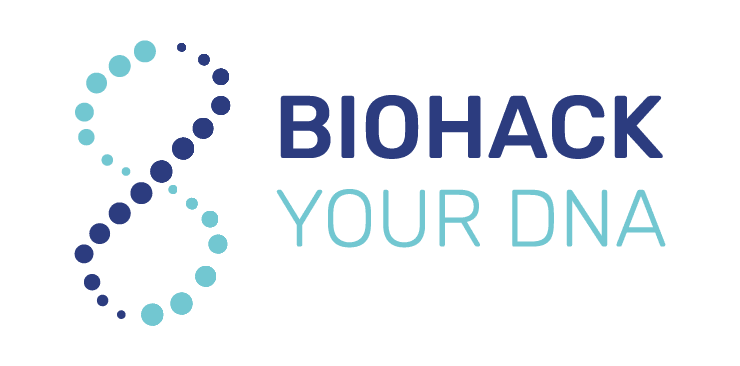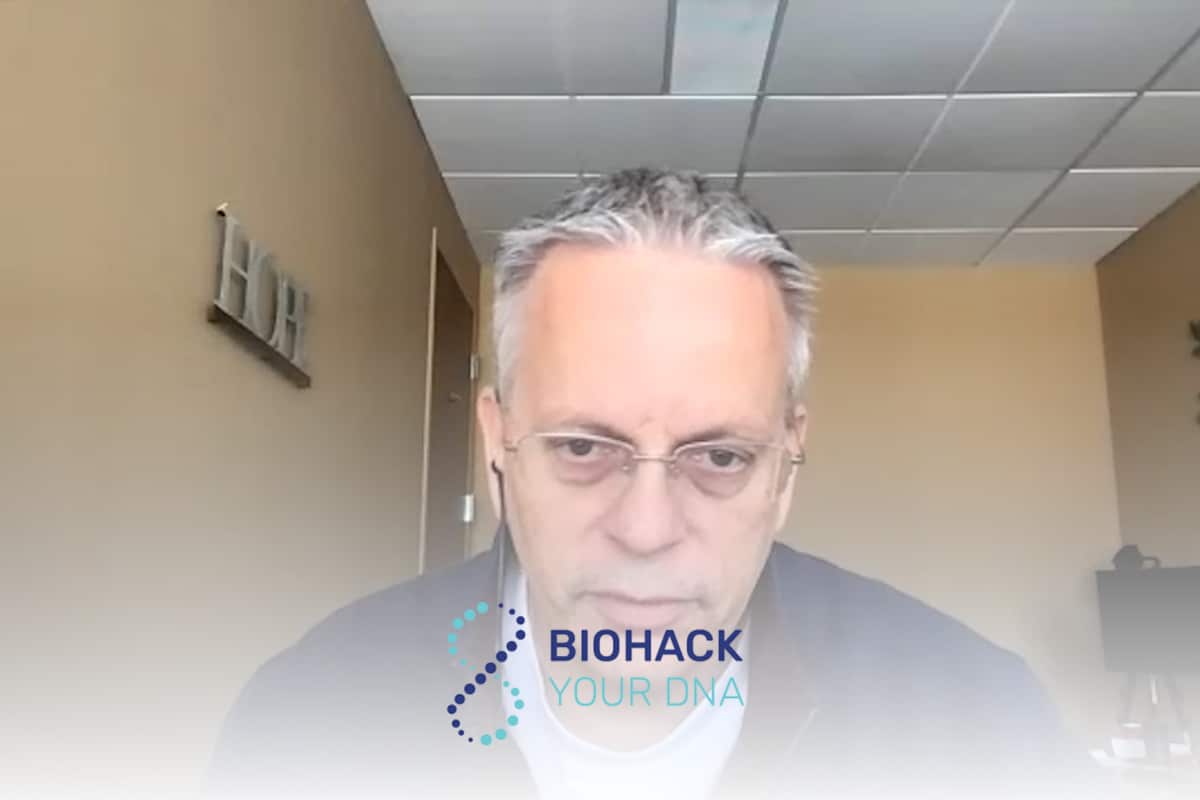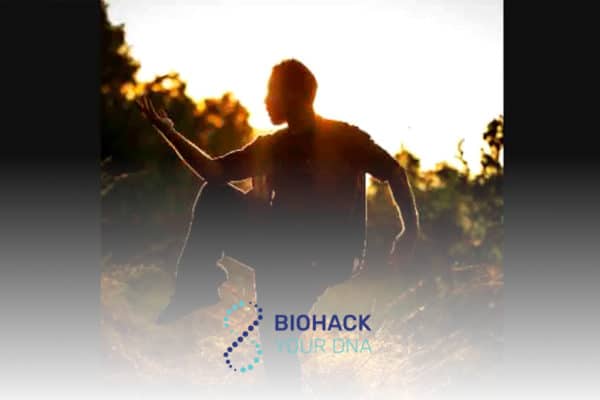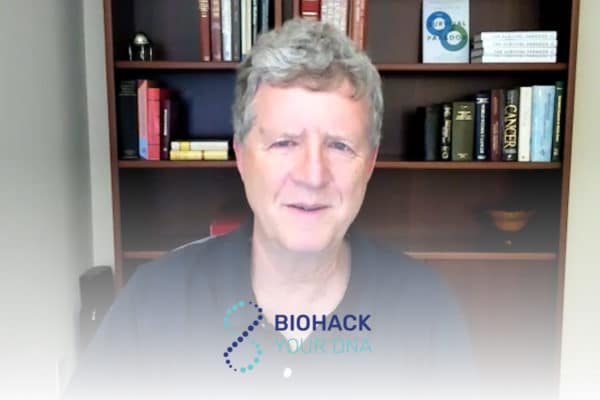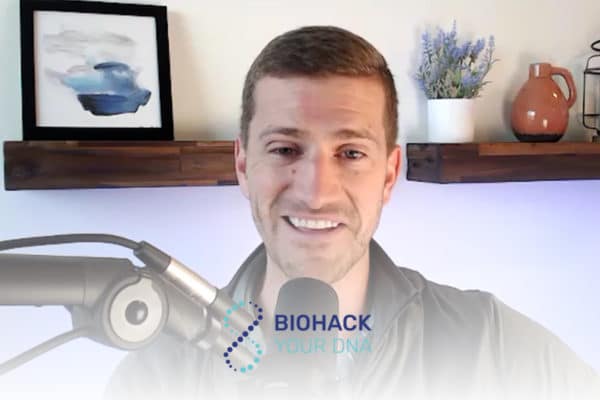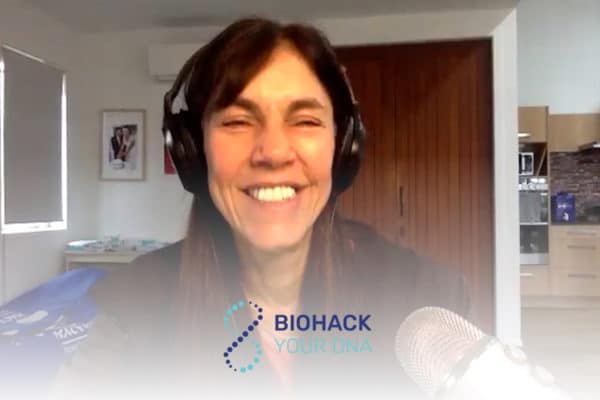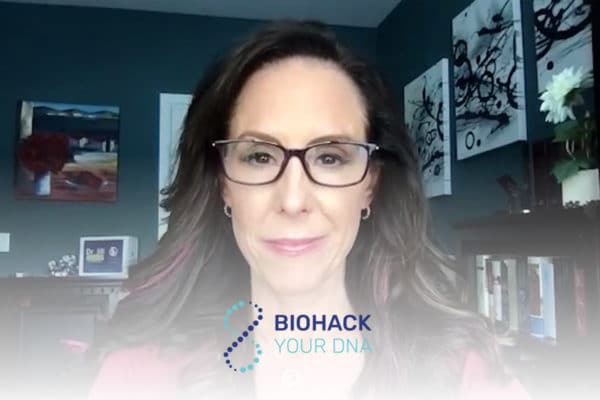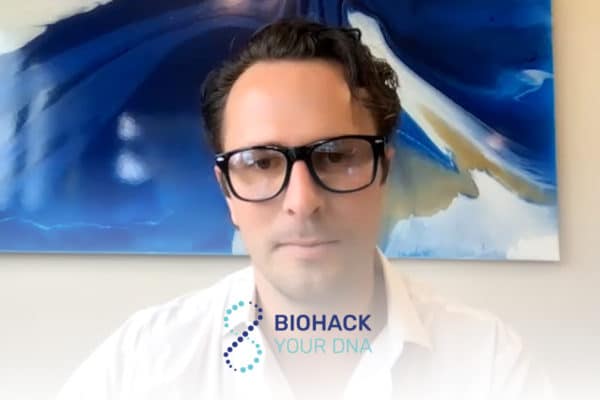Join the discussion below

Kashif Khan is the Chief Executive Officer and Founder of The DNA Company, where personalized medicine is being pioneered through unique insights into the human genome. With the largest study of its kind globally, The DNA Company has developed a functional approach to genomic interpretation overlaying environment, nutrition, and lifestyle... Read More
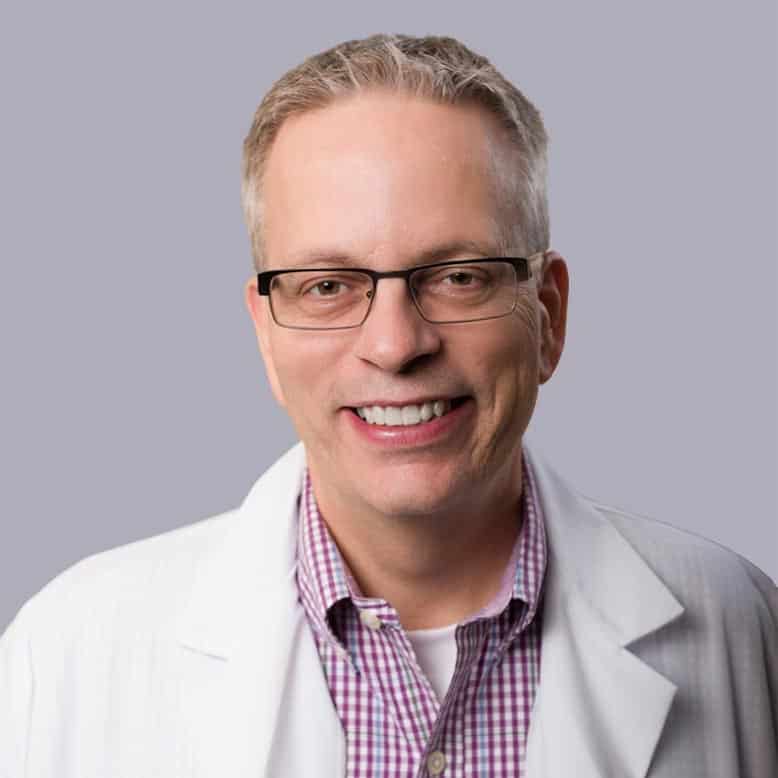
Kevin Conners, DPSc, FICT, FAARFM
Dr. Kevin Conners is the Clinic Director at Conners Clinic, an Alternative Cancer Treatment center. He graduated with his doctorate from Northwestern Health Sciences University in 1986 and has been studying alternative cancer care for over 23 years. He also holds AMA Fellowships and Board Certifications in Anti-Aging Medicine, Regenerative... Read More
- Why your environment may be your biggest threat
- BRCA is not the problem
- The key cancer fighting genes you might be entirely missing
Kashif Khan
All right guys. We’re back with Dr. Kevin Conners and this bio was truly exciting to me because the work is so in line with what we do, and I’m excited to talk to him today and dive a little deeper. Dr. Conners is a clinical director at Conner’s clinic, an alternative cancer treatment center. He graduated with his doctorate from Northwestern Health Sciences University in 1986. He’s been studying alternative cancer care for over 23 years. He holds AMA Fellowships Board Certifications in Anti-aging Medicine, Regenerative and Functional Medicine, Botanical Medicine, and is Board Certified in Integrative Cancer Therapy. So his perspective is truly unique. Dr. Conners is also Certified in Functional Neurology. He has over 300 hours post graduate study in autism spectrum disorders, which we’d also like to touch on today. He’s trained and certified in Epigenetic Clinical Methylation and Nutrigenomics. Dr. Conners is practicing Applied Kinesiology with an emphasis on Botanical Medicine and Homeopathy. He has written numerous books, and I’m gonna tell you something amazing about those books including “Stop Fighting Cancer and Start Treating the Cause.” “The Seven Phases of Detoxification.” And the amazing thing is he’s actually made them available for free. So you can go to Conners clinic.com/books. It’s his gift back to the world. He wants you to have access to the information and download them all for free. Welcome today. Thank you for joining us.
Kevin Conners, D.PSc., FICT, FAARFM
Thank you. Good to be here. Fantastic.
Kashif Khan
So, first of all, just reading what you do in the scope of your experience and knowledge. Like sincerely, I’m excited to talk to you because we hardly get to meet people that sort of both sides of the story and are trying to find that middle ground and truly care for people. And you’ve been doing this for 23 years now.
Kevin Conners, D.PSc., FICT, FAARFM
Yeah. I actually been doing it for longer and that mainly focused on cancer for the last 23 years. But yeah, we’ve added nutrigenomics looking at people’s DNA. I don’t know for seven or eight years ago or whatever, when it first started coming out. Cause it’s just, whenever you year about a new piece of the puzzle, that you can help understand why a person might be going through something and that you could make alterations to their progress. It’s always a blessing so.
Kashif Khan
And you’ve been out there touting that, you know, your genetics, aren’t your destiny, meaning that there’s, although you get pointed in certain directions, you kind of understand what to work on, where to focus, but there’s so much more is what you learn. And I think what you’re talking about, correct me if I’m wrong is the genetic conditions that people are focused on. You know, like you’re born with this switch that needs to be turned on or off. That may equal a cancer, but most cancers aren’t that, right? Is that correct?
Kevin Conners, D.PSc., FICT, FAARFM
I mean, there’s really very little genetic connection directly to cancer. I mean, there’s people with what’s called Lynch syndrome, which is a specific gene. That’s gonna predispose them to colon cancer, but that’s rare.
Kashif Khan
Correct.
Kevin Conners, D.PSc., FICT, FAARFM
Even, you know, among people with colon cancer are very, very small population it’s because of Lynch syndrome. So there from a cancer and genetic perspective, really, I think less than 5% of the cancers have a direct genetic component, you don’t get cancer because of your genes. It’s that indirect piece that if you look at some of different metabolic pathways of the genetic spectrum, you can help prevent all sorts of diseases. If you know what’s going on, it’s kinda like you talked about with, you know, having free access to all our books, it’s our gift to the world to spread knowledge. And it just sparked us thought in my mind is that that’s really it, the more you can know about your body and about what’s going on from a metabolic standpoint, with all your cells and you can, the more you can make changes consciously that can alter the outcomes. And that’s the whole idea.
Kashif Khan
And the thinking unfortunately is that, you know, oh, my mother had breast cancer. It’s in my genes. It’s in my genetics, right? There may be things going on genetically that make you at higher risk for certain exposures to cause that inflammatory or metabolic load. And that’s actually the thing you need to understand and deal with, but it doesn’t directly equal cancer. Cancer that happens to be the spoke that got triggered for you, for somebody else it could have been something else depending on where cellularly. They’re sort of underwhelmed, right? So is that where you dove into sort of the nutrigenomics. To try and understand what are those environment, nutrition, lifestyle factors, what are those loads that equal the net disease?
Kevin Conners, D.PSc., FICT, FAARFM
Right. That’s really it. Because it is those secondary things, tertiary things. So if I have, for instance, if I have a lot of defects on my cytochrome P450 pathways, my liver phase one detoxification pathway. I’m gonna have by that quite possibly a slower liver detox pathway. So let’s say if you and I are both exposed, living a very similar lifestyle, both exposed to the exact same number of toxins. Let’s say if that was even measurable, but let’s say we are both exposed to the same lifestyle, but you have really healthy liver detox pathway genes. So you make, you know, an adequate amount of enzymes for your phase one, phase two liver detoxification pathway. Your liver is gonna be functioning very healthy, and you’ll be able to process toxins faster than if I had a lot of defects on those pathways.
So if I have a lot of stiff defects on my cytochrome P450 or my upon one pathways, my liver is gonna be able to process toxins slower than someone who doesn’t. And that’s the idea. I mean, you can’t give a one to one correlation to what that’s gonna do to a person’s body, but if we’re exposed to the same amount of poisons. I may not get rid of them as fast as someone who doesn’t have those pathway defects. And if you knew about that prior to, you know, being, you know, end up with a diagnosis of a serious disease, you could make some alterations in your lifestyle or may scare you straight and be careful with toxic exposure that can help prevent serious diagnosis in the future.
Kashif Khan
So there’s some people that ask then, Okay, I understand that my liver isn’t, it’s a little suboptimal. Doesn’t work as well as my friend or cousin or whoever. Why does that, why is a net result of that potentially cancer? What’s that bridge? What actually happens biochemistry wise where that toxic load leads to the cellular change like cancer?
Kevin Conners, D.PSc., FICT, FAARFM
Well, the physiology is simple. So if I’m exposed to poisons, whether I breathe them in, whether I ingest them or inject them or put them on my skin and absorb them, those toxins get into my bloodstream. If you can think of it kind of like a cartoon, this is how my brain works. These toxins are circulated around in your bloodstream and they get to the liver and the liver will either say, yeah, come on in. We can process you and get you out of the body. Or if your liver is full from a genetic issue, full from being over exposed to toxins, full from lifestyle of alcohol abuse or other dietary abuse, then that liver says, Hey, we can’t take you, no vacancy. That toxin circulates around the blood again. Asks again, knocking on the door of the liver again, next time it goes around. Still full circulates around again, it’s going to be shun to the extra cellular spaces. You’re not gonna just have a toxic load in your bloodstream. I mean, it’s gonna damage red blood cells.
It’s gonna damage epithelial, endothelial cells causing heart disease, cardiovascular disorders. And actually that’s one of the causes of that, but it’s gonna be ultimately shun to your extracellular spaces and then can cross your cell membranes into your cells. And that’s when it can really do damage. So any sort of toxin, whether it’s a heavy metal or glyphosate or some other pesticide or herbicide or anything. If it gets inside the cell, it can affect cellular function. You have all these different little organelles in the cell that do very specific functions. It’s like literally as busy as New York city inside every single cell of your body, if it affects the DNA, it can affect the replication cycle. So normally most of your cells have a replication cycle of anywhere between 8-24 weeks. Meaning that let’s say your liver cell is gonna reproduce another liver cell in 12 weeks and then that mother cell will die through a process called apoptosis. And that cycle continues. You know, renewed body constantly, and it can reduce slightly degenerate. That’s what aging is. And you could do some things to help hinder that. But if something gets inside the cell, it affects the nucleus and increases that rate of replication. That’s really what cancer is. So the definition of cancer is one of your cells. It’s not an outside thing. One of your cells, something is affecting that rate of replication. And now it’s in a state of rapid replication. That’s what cancer is. And it’s replicating cells that are in a state of rapid replication.
So how fast that rate of replication is whether it’s once a day, instead of every 12 weeks or multiple times a day. Is how aggressive the cancer is. So toxins are a major piece to that. Toxins, anything that gets inside the cell can affect the DNA. It can be a biotoxin like a bacteria or virus, but certainly more common than not it’s a toxin that affects the DNA. So that’s why toxic exposure can overwhelm your liver. Toxic exposure that doesn’t get out of your body becomes a part of your body. So anything you’re exposed to that you can’t get rid of because is a part of you and doesn’t mean it’s gonna cause cancer every time, but you increase your risk of a serious disease like that. If you don’t get rid of it.
Kashif Khan
Right. And this is where there’s a lot of. So we deal with a lot of particularly breast cancer patients where the sort of light bulb that went off is I now know why it. It’s not so much about what, like I have cancer and how do I treat it. That acute response let’s correct it, right? But if you don’t know why it happened, you’re literally gonna correct it to walk back into the exact same lifestyle environment, load toxic. Well, whatever it is you were doing and then wonder why did it come back, right? So that question, that why question, although we’re kind of in that process, it’s not really answered and so we’re not even looking for that answer. That really is the cure, that why?
Kevin Conners, D.PSc., FICT, FAARFM
It really is. I mean, you at least have to address it. You could do chemotherapy and radiation and standards of care, and it could knock you down to no evidence of disease. But if you don’t deal with the cause the chance, I don’t wanna say it’s always gonna come back, but the chance that you have recurrence either, apoptosis or other separate primary cancer, you know, the risk is there. So if you can mitigate that risk anyway possible, you’re just gonna have a better outcome.
Kashif Khan
And now when you’re dealing with cancer patients, when things think have progressed, you know, inter stage three, stage four, how much is this type of work actually affected? Like is this something that can only be helpful at an early stage? Or are there things you can do for that stage four patient that maybe they wouldn’t normally have experienced at the typical alopathic level?
Kevin Conners, D.PSc., FICT, FAARFM
Yeah. Most of the things we’re talking about here not are not being addressed at all at the alopathic level. Matter of fact, you get a cancer patient. It’s not uncommon that they’ll do a genetic profile on them. And patients think that they got a full genetic profile, but really they only did 12 of their BRCA genes or something like that.
Kashif Khan
Yeah.
Kevin Conners, D.PSc., FICT, FAARFM
So they did it get a genetic profile. So when we look at a person’s genes, we’re not just looking at tumor suppressor gene. So your BRCA genes are tumor suppressor genes. And yes, if you have defects in specific BRCA genes, it’s gonna increase your risk of a hormone type cancer like breast cancer, ovarian cancer, or something like that.
Kashif Khan
Right.
Kevin Conners, D.PSc., FICT, FAARFM
However, you can’t change those genes. You can do some things if you do know that you have those defects to help mitigate your risk somewhat. But that’s not really what we’re looking at. We do look at the tumor suppressor genes and more than just the BRCA genes, there’s multiple tumor suppressor genes, cause there’s ways to stimulate those. Even if you have defects, but you have to look at these other pathways. Let’s use the detoxification pathway as an example, cause we look at multiple metabolic pathways with people’s genes. But the detoxification pathway may be one of the most important because even though I have a defect in a tumor suppressor gene. Let’s say I have BRCA gene defects doesn’t mean that doesn’t cause cancer. So your tumor suppressor genes are genes that turn on specific apoptotic cycles. Meaning that if a cell goes in rapid replication, you have these genes in your cells that will turn on these tumor suppressor genes to cause the cell to die. It will cause the cell to die.
If it goes in rapid replication, if I have defects in the BRCA gene, it’s gonna be less apt to die, but still that didn’t cause the replication, something else still got inside the cell and damaged the DNA and caused the rapid replication. If I have BRCA gene defects, then I’m not turning it on a cell apoptotic process that’s killing it. But it’s that defect is not causing the cancer. So just be straight, in order to keep our listeners understanding that piece. However, if so again, then you get back to what the cause is. So is it a toxin? Is it a biotoxin? What is it that got inside that cell and is causing that. If it is a toxin, your toxins detoxify through your liver detox pathways, you have to make sure that those are open genetically and functionally. So it’s not just your genes. You can have very healthy detox pathway genes, but still have a clogged liver for other reasons too.
So you need to address those as a clinician and the more, or you can do that even regardless of whether a person’s in, you know, late stage four, it’s even more important to address those pathways. So yeah, if you can catch a person, you know, when they’re 14 years old and look at their genes and say, Hey, you have these defects, you want to be more careful in this part of your lifestyle. Because of these defects, you might want to supplement these kind of nutrients. Because of these defects, you might be able to push out diseases that that person may or may not get diagnosed with or eliminate that if you can be as proactive possible.
Kashif Khan
So the patients that you’re dealing with in your clinic, what’s the proportion of people that are, you know, gone down this conventional route, meaning that here’s the chemo, here’s the medicine. And the people that are saying, yeah, I’ll work with you at this level. I wanna try what you’re talking about. Is that the bulk of what’s going on?
Kevin Conners, D.PSc., FICT, FAARFM
Well, most patients that’s seek us out, have already gone down a conventional route or are concurrently going down the conventional route. It just is the nature of the met. When a person gets a diagnosis of cancer, it’s a small percentage of people that are that proactive. That are like, boy, I just found out I have cancer and they’re thinking rationally, I’m gonna go find out some alternative things to do. We do get some of those and that’s a joy to work with those people that haven’t gotten a bunch of chemotherapy and such yet. But honestly, most of our patients are either in the middle of chemotherapy or radiation or surgery or have done it and have failed that pathway and then are seeking out alternative care. So the majority of our patients are stage four when they come to see us, that just happens to be our practice. And people are scared when they get a cancer diagnosis and they tend to follow what their ecologist tells them to do. And many have great results, but some have regrets because of that, cause they didn’t slow down and take a look at things as closely as they wish they would’ve.
Kashif Khan
And you have this amazing reputation for these people coming to you after being failed by other methods, which are the sort of go-to conventional methods. And then you end up turning things around. Whereas you know, what was meant to be the tool didn’t work, you know, again, and I think that comes back to well, what is the purpose of the tool. It’s to suppress that the last layer, the symptom versus let’s figure out what’s going on.
Kevin Conners, D.PSc., FICT, FAARFM
Yeah. And the tool is damaging as well. So you’re doing some radiation or chemotherapy. You’re adding a whole lot of toxicants that you have to now detoxify. So if this person actually is suffering from cancer because of failure to detoxify or hyper exposure to some sort of toxin at some point in time, and now you’re adding poisons to the body to kill the cancer. Even if you, that successfully works, you know, you do chemotherapy, it knocks the cancer down. It is so beneficial to currently do a natural approach to support those detoxification pathways, to get rid of that chemotherapy. So it does less damage to your healthy cells.
Kashif Khan
Right
Kevin Conners, D.PSc., FICT, FAARFM
And you have less side effects of the chemotherapy.
Kashif Khan
And another unique perspective you have is you’ve understood the methylation system at the clinical level. You talk to most doctors and you’ll hear the, you know, hear MTHFR and that’s the extent of the conversation and MTHFR good or bad? Then let’s figure out what that means, right? So there’s a lot more going on in methylation than that. And how impactful has that been as in sort of a layer on the detox?
Kevin Conners, D.PSc., FICT, FAARFM
Well, that’s important because a lot of doctors will do, a lot of functional doctors will do just testing on a few genes. Like they’ll look at the MTHFR gene. And if, you know, there’s more hits on that. If you Google it than anything else, because it’s kind of a puddle deep understanding of genetics and oh, well you have a MTHFR defect and so we need to give you methyl group. So they, you know, without looking at the downstream effects of that, you can actually do more harm than good. Even in a non-cancer patient. If that, you know, if a person has a bunch of defects in their biforate pathway, and you’re gonna add a whole bunch of ethyl groups to their combination, you can actually be stimulating excess serotonin and excess dopamine and cause rage issues and anger issues and a whole bunch of different problems that now you’ve just caused more problems by using supplementation because you don’t have enough information that you’re going on taking care of that patient. Now with cancer it’s a whole another ball of wax because we don’t, methyl groups. What do methyl groups do in our body? They help silence genes and we don’t wanna be silencing tumor suppressor genes. So we are very careful in adding methyl groups to cancer patients. We want them to get methyl groups just solely through natural means by eating good foliage. And we give very little mental groups supplementally.
Kashif Khan
So when the person comes to you, look keeps coming back to the liver health detox, taking that toxic insult load off of the cell. So they can come back to life and flourish. What are the things that you’re doing? What are the actual interventions? Is it supplementation? Is it more about diet or what are the recommendations people are getting.
Kevin Conners, D.PSc., FICT, FAARFM
It’s both, I mean, you have to encompass a lifestyle change.
Kashif Khan
Right.
Kevin Conners, D.PSc., FICT, FAARFM
So that person and in a way that that person can continue that lifestyle change. So you don’t, you know, we don’t do diets like, you know, every cancer patient goes on a ketogenic diet or something like that. That’s just not sustainable. Secondly, it’s not you even correct. You know, ketogenic diet can be higher in animal proteins. It can be higher in dairy. Even most cancer patients, dairy is a driver at some point, at some level. Stimulates IGF function increases other growth hormones. There’s hormone, other hormones in dairy that could be major drivers for cancer. So you do have to look at diet. We do supplementation and support detox, pathways supplementally. But I talk a lot about what I call the seven phases of detoxification because elimination phase six is a key. It’s quite often you get patients, especially if they’re in a later stage cancer and using pain meds as well, that are constipated. If you’re constipated, you’re reabsorbing toxins.
If you’re constipated, you’re not eliminating. And I mean, you’re not getting toxins out of your body. Even if your liver is doing the darnest job it can, it’s just dumping it into the intestines and your body’s just reabsorbing it in the larger intestines. So you have to start there, make sure you’re eliminating what I call phase five that is to bind, using some sort of binder of some sort even if it’s just dietary fiber to help bind toxins in the gut so you’re not reabsorbing and just move back upstream that way. So there is there’s physical things to do. We talk a lot about coffee inhibitors, really because the benefit of stimulating parasympathetic function, your parasympathetics are that side of the autonomic nervous system.
That is your neurological control of all your detoxification processes and of your immune system too. So we’re dealing with cancer. We need a uptick of their immune system, as well as an uptick of their detoxification. And those are from a neurological perspective control completely by your parasympathetic side of the nervous system and coffee animals are one of the best ways to stimulate that. So even from doing hot packs over your liver or gallbladder or there’s physical things that a person could do, there’s nutritional things and dietary considerations as well.
Kashif Khan
And just from listening to well, first of all, to your point about elimination, I remember speaking to a clinician who deals with a lot of breast cancer patients. And she said the exact same thing. There’s no point starting the detox if you’re not eliminating and clearing, cause where is it going? You know, so you gotta work on that first, make sure that there’s a flow, the end of the cycle actually exists in that detox, right?
Kevin Conners, D.PSc., FICT, FAARFM
Yeah.
Kashif Khan
But going back to what you were saying, the way you look at cancer and the way you’re describing it and kind of the root, the causality, it’s not the, you know, here’s why we think maybe genetically you have this condition cause you’re mama had it, you know, but here’s, we’re actually talking about like really why? It almost sounds like waiting to get sick and then come and seeing you as a third or fourth step because whatever else didn’t work. You don’t have to, you could actually start now. Like you don’t, being sick shouldn’t be the wake up call to start doing some of the things you’re talking about. Cause we’re talking about truly root cause. Meaning that prevent it. If you understand why it’s happening?
Kevin Conners, D.PSc., FICT, FAARFM
Yeah. Well, we have a very misguided understanding healthcare in, you know, in the Western world. We wait till we do get sick and then we try to treat ourselves instead of trying to take care of ourselves so that we don’t get sick.
Kashif Khan
Right.
Kevin Conners, D.PSc., FICT, FAARFM
And it’s hard to change mindsets and the entire medical profession is built upon that model. So they’re not willing to try to change mindsets. So we’re doing it at a grassroots level, trying to do that. Now when we have cancer patients come to us and we go through a whole genetic profile with the cancer patient themselves, invariably the family member sitting and watching that Zoom call going over their gene are like, Hey, how can I do this for myself and my kids? And well, that’s a much wiser a choice really to look at your body, not just from a genetic perspective, but from, you know, a holistic perspective prior to getting sick and you make better choices in life. Based upon that using a person’s genes, it could be helpful because I used the term scared straight earlier. It can be beneficial to say, Hey, you have this defect. You, you know, you do not detoxify glyphosates very well at all. You need to be careful.
This is the pathway that you, you know, you make this and you do have these defects. It doesn’t mean that you don’t make this very well. But you should support it this way. You know, think about, you know, this dietary approach. You don’t get rid of histamines very well. You have all these defects in your HNMT genes. Well, I don’t have any problems. Well, you are presupposed to that. So maybe think about, you know, doing this in your lifestyle. So you can point people in right directions and it can give them information. I just think the more information that you have, you can be a better caretaker of your own health instead of relying on a doctor at all. Personally, I just don’t like doctors. So I just think. So I try to, when we get information we try to make videos and do blog posts and write books to get that information out there. So people can be their best advocate in a world that is growing more and more leery of practice of medicine. And you need to be your own doctor basically.
Kashif Khan
And when it comes to working with somebody like yourself, is there resistance? I understand, so I’m in Toronto, Canada, right? We have a very different healthcare system here. The problems are the same in terms of how we think about our health and the entitlement of I’ll just do what I want and the doctor will fix me, but the way we pay for it is different. Here we have a government that pays for all our medical bills. So when it comes to people seeking out, you know, help of the nature describing how do they go about it? Is this them now having to go on and about on their own cause insurance won’t help them? Or what does that typically look like?
Kevin Conners, D.PSc., FICT, FAARFM
Yeah. I mean, we have been non-insurance type practice for 20 years.
Kashif Khan
Okay.
Kevin Conners, D.PSc., FICT, FAARFM
So yeah, the people do not utilize their insurance when they come to us. In America, at least people more and more people have, you know, five, 10, $15,000 deductible. So they’re used to paying for some of their care. Now to me, that’s a beautiful thing to have such a great deductible. Less people are running to the doctor just to get antibiotics for their kids ear infections that they shouldn’t be doing. So people are allowing their immune system and trying to support their immune system to deal with viruses and bacteria things. So I think that’s a better way to go about, you’re gonna build your own antibodies instead of trying to wipe out your flora with an antibiotic. So there’s a growing, you know, amount, a number of people that are seen and the failures and the standards of medicine that are out there and are seeking out clinicians like us. We certainly never have a problem. With finding patients, we have to turn patients away constantly.
Kashif Khan
Right.
Kevin Conners, D.PSc., FICT, FAARFM
And that’s part of why we try to educate and put out blogs and videos and things and do interviews like this. Because the more we could help people be able to help themselves. I think that’s, that is really the future. Is using clinicians like myself and others that are out there as guides, but then you taking more of an active role in your own healthcare is really gonna be where we’re gonna be at in the future.
Kashif Khan
So you’re, I mean, using that example of your child with ear infection. I’ve been through that by the way. And before I knew better, that’s exactly what I did. I, you know, I went and got the antibiotics cause my mother, my kids’ grandmother yelled at me, said, Why aren’t you at the doctor yet? Right?
Kevin Conners, D.PSc., FICT, FAARFM
Right.
Kashif Khan
Cause that’s thing you were supposed to do. And again, this is a few years before we dove into the side of our, the world and learned this and started practicing this ourselves. So how does somebody in that position? What’s that shift? What do they do? Cause in that moment, first of all, what should they have done? I know what you’re saying. If they have had the proper immunity built up, maybe the infection wouldn’t have happened, but it happened because it wasn’t built up. So what alternatively should they have done? What are the habits they should start adopting? And that warning flag that your child has an ear infection. That should be the point and the same context can be applied to yourself. You’ll find yourself in the same position. What are those habits you can start adopting to take yourself away from I know I’m in the wrong place now to like here’s where I should be.
Kevin Conners, D.PSc., FICT, FAARFM
I think the first habit to adopt is start asking yourself better questions. And maybe one of the best questions start asking is why? I always ask why? I mean, maybe you can’t always come to the answer to that. Why do I have strep? You know, why do I get a strep infection every winter. The answer might not be completely clear, but if the more you can understand simple physiology the better. So start educating yourself, start listening to webinars on, you know, devour or websites like ours and others, and read good books to teach you that boy, every time I get a strep infection, the reason why I’m susceptible to it, is I run to get antibiotics. Well, if you do that, you never allow your body to start making antibodies. So understanding simple, simple physiology of an immune response, if I’m exposed to an infectious organism, I fire a what’s called a Th one inside of my immune system response to try to kill it.
That’s when I’ll get a fever and not feel really well. If it can’t kill it, that sickness progresses. And then by Th one side suppresses a little bit. My Th two side, the B cell side fires, and that’s what makes antibodies. Problem is many people run to the doctor prior to that taking place, go get an antibiotic, which if it’s a bacterial infection, it will knock down the infection. And now I feel better. And I think I did the right thing. Well, you never allowed your body to go through that cycle of a Th two reaction, a B cell reaction. That’s what makes bodies. So at the end of the game, after two weeks of having this, you know, after this exposure and having the infection of this strep infection, now I’m better. And I’m back at work or school thinking that I’ve, you know, I’ve improved my immune system. But if I went down the pathway of getting an antibiotic, I really didn’t improve my immune system at all. I actually hindered it. So the health of one’s immune system, yes it is. Do I have a good, healthy white blood cell count, but the real health of one’s immune system is typically isn’t measured through a standard blood test. Because the health of one’s immune system really quantified is how many circulating antibodies do I have against different pathogens?
Kashif Khan
Right.
Kevin Conners, D.PSc., FICT, FAARFM
So if I have circulated antibodies against strep and against different viruses and different bacteria, I am gonna be less apt to ever quote unquote, get sick because when I’m exposed to that pathogen or a similar pathogen that antibody tags it right away. And my immediate Th one response prior to me ever feeling sick or getting a fever kills it, and I didn’t get sick, but Hey, Bob and my cubicle next to me had a horrible strep infection and I never got strep. I don’t get strep. Why? Because you have circulated antibodies against strep. Therefore your immune system killed it. So we need to just redefine the health of our immune system and support it wisely. It allow myself to be sick, kind of like, you know, great grandma did.
What she do, when the kids were sick, they got chicken soup and laid in bed and allowed their body. Maybe she didn’t understand physiology, but ignorantly, she allowed that kid’s body to, you know, fire a Th one and a Th two response make antibodies that child is now going to be less susceptible to similar pathogens because they have circulated antibodies against them. And you’ve actually improved that person’s immune system. Now I’m not so naive to think that the benefits of antibiotic therapy have saved millions of people’s lives, but it’s improper use of it that is ultimately hindering the growth and stealth fullness of person’s immune system. And we just need to be wise of that. So just understanding some simple concepts and physiology could be really beneficial.
Kashif Khan
The way you describe it is almost like exercising, you know, just that you wanna put on muscle, you gotta break muscle. You gotta go to the gym and rip it apart. So it builds back on same thing. You wanna get smarter, go read books, you gotta train it, right? So you can train your immune system to get stronger with exposure, right?
Kevin Conners, D.PSc., FICT, FAARFM
Yeah.
Kashif Khan
And not that you want to go run around and go suck up every virus from every tabletop. But that process of how often you get sick, that’s just exposure. But how sick you get that’s your measure of health? Meaning can I actually cope by, I do have antibodies, right?
Kevin Conners, D.PSc., FICT, FAARFM
Yeah.
Kashif Khan
And so, yeah. And that’s very great advice by the way, for anyone who’s listening, cause we’re too quick to, and I understand especially when it’s your children. You know, I don’t want to get too sick. I don’t want their ear, you know, to pop or whatever could happen to the ear drum. But for the most part they’re resilient and you have to let them go through that exercise.
Kevin Conners, D.PSc., FICT, FAARFM
Yes, that’s exactly, right?
Kashif Khan
Yeah. So sorry. So going back to the cancers, I took you derail you a little bit, but it just to, you know, your wisdom, we wanted to share it. The 5% those genetic cancers, the ones that are there’s a direct cause. It’s, you know, you’re going to have it because of some gene variant. What you’re suggesting in terms of the detox and you know, liver health and less load on the cell cellular health ultimately, is that also gonna help that? Are we saying that that’s so direct causation that this doesn’t matter?
Kevin Conners, D.PSc., FICT, FAARFM
Oh no. So let’s say there’s a direct causation. A person has Lynch syndrome and they, you know, they have multiple family members that had colon rectal cancer. Now they have colon cancer, still how you treat it is no different than if they didn’t have Lynch syndrome. So you still wanna help detoxify their body. You still want to increase that person’s immune system cause ultimately it’s your immune system’s response directly on the cancer. That’s gonna help that person overcome the cancer. So yeah, so it wouldn’t change way you treat the person. The 5% that have cancer because directly from a genetic component, that is just a piece of the cause that you can’t change. There’s so many other factors that you can affect and you wanna address those and you still got to get the body to fight that and get in a direct immune response to that and stimulate the immune system, stimulate parasynthesis all those things that go along with it.
Kashif Khan
Okay. And when you talked about toxins, so everything we’ve talked up about up until now has been sort of external. Do you ever look at the internal, for example, oxidation or hormonal toxicity like estrogen toxicity and those levels and how they may cause an additional load?
Kevin Conners, D.PSc., FICT, FAARFM
Oh, for sure. So like oxidative stress, I mean that is again, all almost always caused by toxins oxidative load. So that’s kind of on the same lines, but the hormonal piece is another piece. So, you know, people think that it’s so let’s just talk about good and bad hormones. Well, they’re all good. There’s just certain metabolites of estrogen and progesterone that normally are not supposed to stay in the system very long. You’re supposed to get rid of them through the detoxification pathways and you do get rid of them, same the way you’ll get rid of any poison. You’re gonna dump it into the colon via the bile, into the small intestine. It’s gonna go into the colon. And again, the problem is that we reabsorb those things. Estrogens are commonly reabsorbed in the lower descending colon. So if you can bind those with binders, make sure your intestinal transit time is is correct. So you’re not reabsorbing those things the better off it’s gonna be, but then there is these bad estrogens that can attach to certain receptors on cells. Typically they’re not the cause of cancer though. So it’s another thing to understand. Bad estrogens aren’t getting inside the cell interrupting the replication rate of cells, but they are blocking certain receptors on the outside of cancer cells, not allowing apoptosis.
Kashif Khan
Right.
Kevin Conners, D.PSc., FICT, FAARFM
So getting, so it’s important to get rid of those bad estrogens, but you still have to address other causes that as if affecting the replication cycle and you still have to follow back that stream and help with that detoxification of those and look back at the pituitary and make sure you’re not making excess estrogen and or how you’re exposed to exogenous estrogens. And was this whole other discussion there too so.
Kashif Khan
So you actually remind me of a family that we dealt with where the mother had breast cancer when she came to see us for the fourth time. And she was probably in her late forties, I would say, and her son by his twenties, I think he was in his early twenties had testicular cancer. So they said that’s genetic without knowing, you know, what that really means. But it sounds like it. Yeah. My son had what I had. And so we looked at her hormone pathways and like you were talking about that estrogen metabolite, right? You can produce two hydroxy, estrogen four or 16. And that’s 16, that toxic stuff, is what the mother was producing. That was her net metabolite every month. And her son was doing the same thing. He inherited the same genetic legacy. Doesn’t mean that they were born sick. It just meant that they produced this toxic metabolite every month from their hormone. Well, for the male, it would be every day.
For the mother, it was every month. That’s causing, like you said, this toxic insult to the cellular structure. Then you think, well, the mother was also taking the birth control pill for like 10 years and adding even more estrogen fuel to the fire, right? Then you have to ask about estrogen mimics and chemicals and foods and what’s that load. And that’s why the thing that people think about isn’t consequential in terms of diet. Yeah. That could be the thing.
Kevin Conners, D.PSc., FICT, FAARFM
Well, and the thing is, if you really did a study of, you know, 10,000 people, you’d find groups of people that have that same genetic makeup that are making excess 16 hydroxy estrones and don’t have cancer. Well, why is that? Because they have other healthy detox pathways that are getting rid of them.
Kashif Khan
Yeah.
Kevin Conners, D.PSc., FICT, FAARFM
And you know, they have good elimination. They’re not reabsorbing them. So you have to look at the body as a whole. And that’s where the practice of medicine currently fails as separates it in this systems and looks at them as just in little pieces. But your body doesn’t function that way. Everything is dependent upon everything else. And you have this synergy that needs to be taking place, not just between cells, between organs, between systems and when there’s any failure there, it leads to problems elsewhere. So need to take as high up stance and look at everything as possible from a physiological standpoint to really help somebody.
Kashif Khan
And it sounds like your answer to that, because as you said, you go to your the conventional doctor, you’re not gonna get that sort of perspective, right? Because like you said, they’re trained in the buckets, I do this, I do this. And I have blinders on. So this is what I do. And I do it really well. I’ve learned about it, but ask me about this or this, I don’t know, right? So in order for the patient to sort of put themselves back in the middle, the answer to that, as you said, is learn, you have to go out there and download, read webinar, educate. Because you may not get beyond the blinder perspective from whoever you’re dealing with.
Kevin Conners, D.PSc., FICT, FAARFM
Yeah. And I assume that anybody listening to this is in that category that they want to do that. Otherwise it wouldn’t be listening to it. So hats off to them. But the more you can learn, the more you can, the more knowledge you can gain, the more equipped that you’re gonna be able to make better health decisions for yourself, for sure.
Kashif Khan
And then you need that quarterback that can cause there’s also the concern. You go read something, you find some information. Somebody may stumble across on their own. Oh, I need to understand my detox pathways, right? Then they may learn about some supplement. And then they may say, well, how’s this going to affect my chemo? How’s this gonna affect my radiation? And when they go ask the doctor, they say do not take anything other than what we’re giving you because it may affect it, right?
Kevin Conners, D.PSc., FICT, FAARFM
Right.
Kashif Khan
Really you need that quarterback that has that knowledge set beyond your clinician. Who’s giving you the chemo, which nobody’s telling you what to do. Just, you need to supplement it with other things that are dealing with the root while you deal with that sort of acute problem.
Kevin Conners, D.PSc., FICT, FAARFM
Right. Exactly.
Kashif Khan
Yeah. So that’s awesome. So I would ask you, I mean, everything you’ve said until now has been mind blowing and exactly. I think what everybody was hoping to get from you, you know, from the books you put out there, what would you say are sort of the top? I understand we keep going to detox and understanding that what are the areas top two or three that people are exposed to toxic insults that they don’t even realize?
Kevin Conners, D.PSc., FICT, FAARFM
Well, probably the biggest toxic insult that we see as a causative issue with cancer is pesticides and herbicides.
Kashif Khan
Okay.
Kevin Conners, D.PSc., FICT, FAARFM
And it’s people, even people like herbicides, it can’t be because I’ve been eating organic for the last 20 years. It’s just, they’re just everywhere now, just everywhere. I’ve been tempted multiple times to bring, you know, organic vegetables into my organic chemist friend, just to test them. Just haven’t had time to do that. But I would not be surprised if they’re loaded with pesticides and herbicides, even organic fruits and vegetables. It’s like, how do you, can we wash these off? Can we get rid of these? We just poisoned our world to the degree, I don’t know how it’s gonna be improved. But it definitely, you know, consumer supply and demand drives things. So if people can just purposely start buying more organic thing, it’s going to, it’s gonna drive, you know, the production of more organic things. So we tell people regardless, you have to be supporting detox pathways, assuming that you’re overwhelmed. Even if you don’t know your genetics, you just need to do as many right things as possible. You’re never gonna be able to prevent all disease. You’re never gonna be able to prevent all cancers. You just try to do everything as well as you can, without becoming too anxious about it. And you’re gonna have best result.
Kashif Khan
And that sort of cognition, you leave your house and you now know that you take a step on a lawn, you go golfing, you go to a, you know, a restaurant with a fancy garden. You know, whatever it is, that’s all the stuff that you’re not meant to be breathing in. And it’s as pretty and beautiful as it is. And it doesn’t, you know, it doesn’t look like a threat. A lot of it is coming from there and it’s everywhere, right? And it’s yeah. So it’s even something as simple as Teflon coated pan has estrogen mimics in it that you would never think are unhealthy. You’re paying more, it’s a more expensive pan, right? But it’s causing you bigger problems. So it’s starting to educate. If you do that one thing, you know, learn what are these things that I’m surrounded by, that I don’t even know are slowly poisoning me, like you said.
Kevin Conners, D.PSc., FICT, FAARFM
Right.
Kashif Khan
Right. So, yeah. And we had, actually one last thought. You reminded me of a particular patient who had an extreme eczema issue just wouldn’t go away and over and over again, they were going doctor to doctor, cream, cream steroids, whatever they were doing all this stuff. And when we met them, were like when did this start? Cause it was adulthood eczema. This started, I think it was in their thirties. We brought it back down to the date that they changed their mattress and their mattress was completely lated in fire, retardants and chemicals that were designed to protect them, right? And it was off gassing cause it was in some plastic bag and they opened it up and all of a sudden they’re breathing that stuff in for the first couple weeks. It has off gases. And then they continue to breathe in that memory foam, chemical and the fire retardant on the fabric on top. And that was the thing that made them sick.
Kevin Conners, D.PSc., FICT, FAARFM
Yeah.
Kashif Khan
Right. So the answer.
Kevin Conners, D.PSc., FICT, FAARFM
It the little things like that, that most practitioners don’t ever get a finger on that you need to, people need to educate themselves. And I remember my daughter years ago, my wife called, she broke out in hive. She had hives all over her body. Well, I thought, oh for sure, it’s probably all the stuffed animals. She was the one that had, you know, 40 stuffed animals on her bed. I test with kinesiology. Brought, came home, tested none of those things. When into the bathroom. My wife had just purchased just one of those little round rugs in front of the sink. That’s what the problem was. The whole treatment procedure for her was take the rugs and throw out in the garage. Her hives went away. It’s just chemicals that you can’t see that are offgassing that you’re breathing in, that your immune system can react to, can cause a hyper histamine reaction or worse. And give you just a world of problems because of it. So don’t, you really kind of gotta become a detective really like.
Kashif Khan
Yeah, yeah. Take control and work on it yourself. And this has been truly eye opening. Awesome. We’re taking something that people believe is taken for granted. Like I’m getting, my mother had breast cancer. My aunt had it, you know, it’s in my genetics and we’re unpacking the, you know, the answer to the question, well, why does it even happen? And now we’re learning that you can actually control your destiny if you understood how to deal with the root cause like throwing that rug in the garage, right? And that’s essentially what you’re saying about the cancer. Figure out what the rug is, right? Get rid of it, figure out your capacity to deal with the rug at the genetic level, right? And that’s awesome. And thank you for the amazing work you do. Thank you for joining us. This was truly eye opening. Any last thoughts before we end?
Kevin Conners, D.PSc., FICT, FAARFM
Nope. Thank you for all you’re doing. You know, if you want any more information about we do all my books are available on our website. We just encourage people to download them and read up and learn more about how to care yourself from as many different people as possible so.
Kashif Khan
Awesome. Thank you so much. It was a pleasure.
Kevin Conners, D.PSc., FICT, FAARFM
Thank you much.
Downloads
